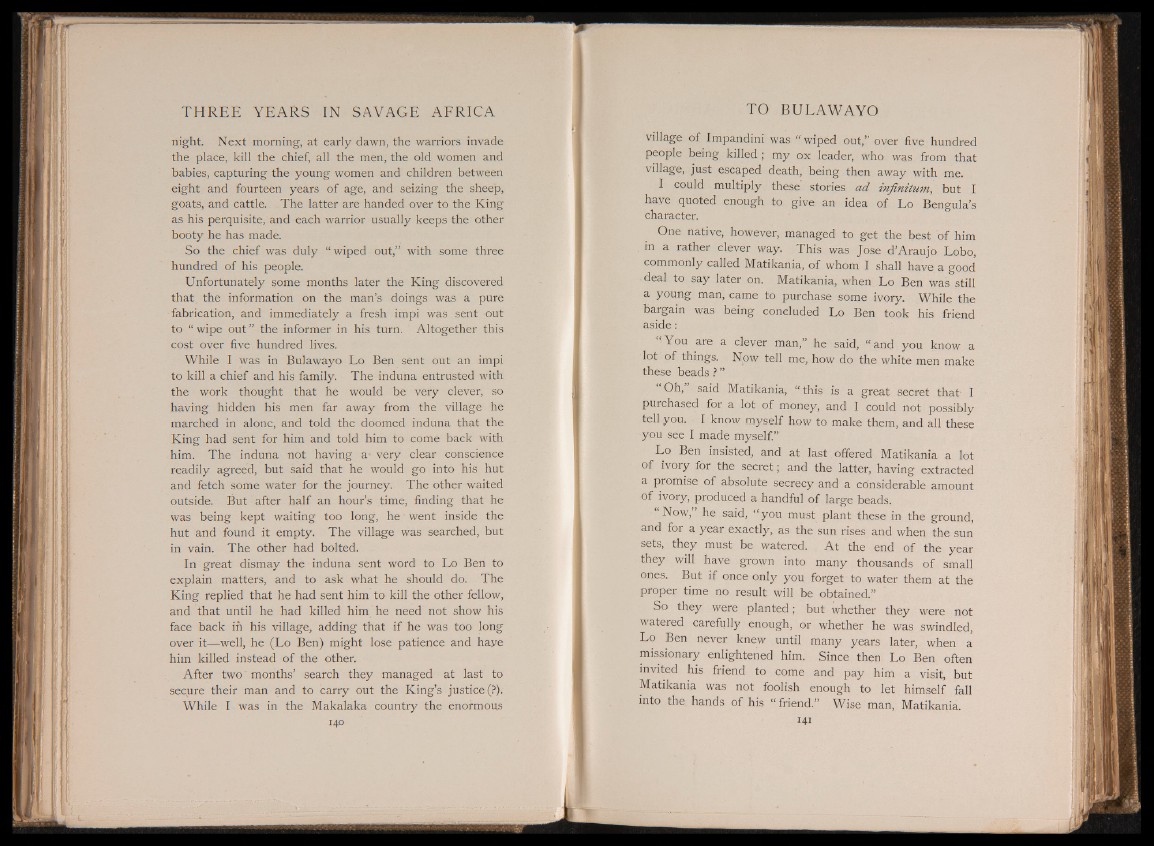
night. Next morning, at early dawn, the warriors invade
the place, kill the chief, all the men, the old women and
babies, capturing the young women and children between
eight and fourteen years of age, and seizing the sheep,
goats, and cattle. The latter are handed over to the King
as his perquisite, and each warrior usually keeps the other
booty he has made.
So the chief was duly “ wiped out,” with some three
hundred of his people.
Unfortunately $ome months later the King discovered
that the information on the man’s doings was a pure
fabrication, and immediately a fresh impi was sent out
to “ wipe out ” the informer in his turn. Altogether this
cost over five hundred lives.
While I was in Bulawayo Lo Ben sent out an impi
to kill a chief and his family. The induna entrusted with
the work thought that he would be very clever, so
having hidden his men far away from the village he
marched in alone, and told the doomed induna that the
King had sent for him and told him to come back with
him. The induna not having a* very clear conscience
readily agreed, but said that he would go into his hut
and fetch some water for the journey. The other waited
outside. But after half an hour’s time, finding that he
was being kept waiting too long, he ■ went inside the
hut and found it empty. The village was searched, but
in vain. The other had bolted.
In great dismay the induna sent word to Lo Ben to
explain matters, and to ask what he should do. The
King replied that he had sent him to kill the other fellow,
and that until he had killed him he need not show his
face back in his village, adding that if he was too long
over it—well, he (Lo Ben) might lose patience and haye
him killed instead of the other.
After two" months’ search they managed at last to
secure their man and to carry out the King’s justice (?).
While I was in the Makalaka country the enormous
140
village of Impandini was “ wiped out,” over five hundred
people being killed ; my ox leader, who was from that
village, just escaped death, being then away with me.
I could multiply these stories ad infinitum, but I
haye quoted enough to give an idea of Lo Bengula’s
character.
One native, however, managed to get the best of him
in a rather clever way. This was Jose d’Araujo Lobo,
commonly called Matikania, of whom I shall have a good
deal to say later on. Matikania, when Lo Ben was still
a young man, came to purchase some ivory. While the
bargain was being concluded Lo Ben took his friend
aside:
"You are a clever man,” he said, “ and you know a
lot of things. Now tell me, how do the white men make
these beads ? ”
Oh, said Matikania, “ this is a great secret that- I
purchased for a lot of money, and I could not possibly
tell you. I know myself how to make them, and all these
you see I made myself.”
Lo Ben insisted, and at last offered Matikania a lot
of ivory for the secret; and the latter, having extracted
a promise of absolute secrecy and a considerable amount
of ivory, produced a handful of large beads.
“ Now,” he said, “ you must plant these in the ground,
and for a year exactly, as the sun rises and when the sun
sets, they must be watered. At the end of the year
they will have grown into many thousands of small
ones. But if once only you forget to water them at the
proper time no result will be obtained.”
So they were planted; but whether they were not
watered carefully enough, or whether he was swindled,
Lo Ben never knew until many years later, when a
missionary enlightened him. Since then Lo Ben often
invited his friend to come and pay him a visit, but
Matikania was not foolish enough to let himself fall
into the hands of his “ friend.” Wise man, Matikania.
141